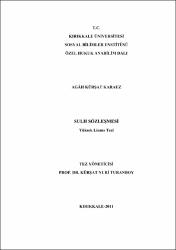| dc.contributor.advisor | Turanboy, Kürşat Nuri | |
| dc.contributor.author | Karauz, Agah Kürşat | |
| dc.date.accessioned | 2021-01-16T18:55:00Z | |
| dc.date.available | 2021-01-16T18:55:00Z | |
| dc.date.issued | 2011 | |
| dc.identifier.uri | | |
| dc.identifier.uri | https://hdl.handle.net/20.500.12587/14407 | |
| dc.description | YÖK Tez ID: 308602 | en_US |
| dc.description.abstract | Bu çalışmanın amacı sulh sözleşmesi kavramını incelemek, hukuki niteliğini açıklamak, benzer kurumlarla olan ilişkisi ve farklılıklarını ortaya koymaktır. Sulh tarafların aralarındaki anlaşmazlık veya şüpheyi karşılıklı tavizlerde bulunmak suretiyle ortadan kaldırdıkları bir sözleşmedir. Sulh, tarafların hukuki ilişkiden kaynaklanan uyuşmazlıklara kendi aralarında yapacakları sözleşme ile son verebilmelerini amaçlar. Yani ihtilaflı bölüm sulh sözleşmesi sayesinde dostane bir çözüme kavuşabilir.Sulh, iyi bilinen ve geniş uygulama alanına sahip sözleşme olduğu için kanun koyucu tarafından hem Türk Borçlar Kanununda hem de İsviçre Borçlar Kanununda düzenlenmemiştir. Bu eksiklik Yargıtay Kararları ve doktrin tarafından giderilmeye çalışılmıştır. Sulh sözleşmesinin düzenlenmemiş olmasına rağmen birçok kanunda sulhe değinilmiştir. Ayrıca sulh kurumu, Türk Hukukunda ayrıntılı bir biçimde incelenmemiştir. Sulh sözleşmesinin tez konusu olarak seçilmiş olmasının en önemli nedenlerinden birisi de budur. ? | en_US |
| dc.description.abstract | The aim of this study is to analyse the compromise agreement and to explain judicial quality to determine the relation and difference of it among similar institutions. Compromise is a contract with which the parties to legal relationship eliminate the dispute or the uncertainty about this relationship by reciprocal easing (settlement). Compromise purposes that the arguing parties to a legal relationship shall settle by private contract. That is to say, the parties to a dispute may reach an amicable settlement thanks to compromise.For the reason that compromise agreement is well-known and has a wide range of application, this contract isn?t legally described by legislator neither in Turkish Code of Obligations nor Swiss Code of Obligations. Supreme Court and doctrine tried to supply the law of this deficiency. Although compromise isn?t described by legislator, it is dealt with many codes. Futhermore compromise instution has not been examined sufficiently in Turkish Law. This is one of the most important reasons of why the commitment of compromise has been selected as the thesis topic. | en_US |
| dc.language.iso | tur | en_US |
| dc.publisher | Kırıkkale Üniversitesi | en_US |
| dc.rights | info:eu-repo/semantics/openAccess | en_US |
| dc.subject | Hukuk | en_US |
| dc.subject | Law | en_US |
| dc.subject | | en_US |
| dc.subject | | en_US |
| dc.subject | | en_US |
| dc.subject | | en_US |
| dc.title | Sulh sözleşmesi | en_US |
| dc.title.alternative | Compromise agreement | en_US |
| dc.type | masterThesis | en_US |
| dc.contributor.department | KKÜ, Sosyal Bilimler Enstitüsü, Özel Hukuk Anabilim Dalı | en_US |
| dc.identifier.startpage | 1 | en_US |
| dc.identifier.endpage | 111 | en_US |
| dc.relation.publicationcategory | Tez | en_US |
















